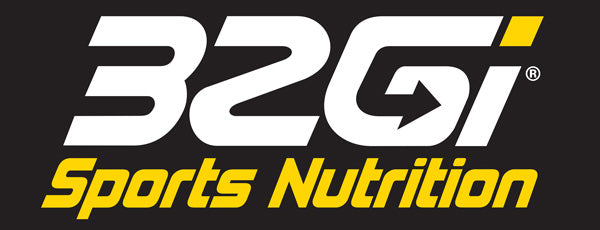Are your 2017 New Year’s resolutions diet based? On this episode of 32Gi Sports Nutrition, Mark Wolff gives both in tune, and in need of tune athlete’s; tips for improving their diets in 2017. For both groups, the ultimate goals should be improved health. Listen to this…
Transcription:
Thanks for joining us once again on 32Gi Sports Nutrition; it’s been an absolutely fantastic year on the podcast so far. If you do want to find out on that content that we have done, if this is the first time you are joining us, do go look on 32gi.com. There’s a whole lot of information on the website. All you need to know about the podcasts, about diet and of course about all the great products that 32Gi do offer.
Today Mark Wolff joins myself Mr Active, David Katz once again and we’re heading into a new year. We’re heading into 2017. Every year people have resolutions. They decide and a very popular one, should I say, is improving diet. Eliminating things from your diet, cleaning up your diet. Mark, let’s just look at that, if that is someone’s New Year’s resolution. If that’s their goal, they want to improve their diet in the New Year. What are the best ways? What are the things they should be looking at cutting out?
Mark Wolff: It’s an excellent question Dave and before we even say: Let’s look at the diet for 2017. I would say that one of the things that people should be looking at should be improving their health. Obviously nutrition plays the most critical role. I think that would be a nice goal, is to say: What can we do from a nutrition point of view? Obviously improve our health and also benefit, there are gains that can come from improving your nutrition.
How blood tests can flag your nutritional needs
Generally, when it comes to cleaning up a diet, a lot of people say to me: What should I or shouldn’t I be eating? I think it depends on the current lifestyle of that person at that point in time. If somebody is already eating pretty well and they’re looking at making positive changes in their nutrition going forward. They’re not sure what to do and maybe they’re athletic.
Very often I recommend running a full set of blood tests and checking all the minerals and vitamin levels. Obviously checking specific counts in the blood which could be on the low/high end. That could actually lead into nutritional changes which would be able to bring those levels into much more of a healthier space. If you’re looking at it from an athlete’s point of view, not just from a doctor’s point of view. Saying your blood is quite normal.
Sometimes blood actually tells you what to eat. I think that that’s a very good starting point. What I’m basically saying is, by doing a medical and doing a full blood, it will actually set you on the right path for 2017. So that you know you’ve got a snapshot of your current health and you’ve got the ability to actually pick your nutrition going forward based on those results. I think that’s more of an in depth, for somebody who is more serious and takes their health seriously. I think you could go that route.
The importance of keeping a food journal
If you’re talking about somebody that’s just looking at making smaller changes and trying to improve their diet. I would say the first thing you need to do is write yourself a food journal. See what you’re actually currently eating on a weekly basis.
The reason you would do that is because a lot of people, when they’re eating from morning to night and then from day to day, over a weekly period. They don’t really understand what they are consuming. When you don’t see what you are consuming it’s very difficult to make changes which could actually be more beneficial as far as the nutrition intake goes.
By doing a food diary for yourself you can actually see what percentage of foods you’re eating badly. What percentage of foods you’re actually eating that are good foods and you’re able to make the changes. In other words, trying to shift the percentage in the favour of eating well. Removing the bad out. That could be in the form of eating out, eating cheat meals or takeaways or even just consuming and cutting out soft drink beverages.
For example, somebody might drink a soft drink once a day, maybe try and cut it down and drink it only once a week. Try and incorporate more healthier foods into that. It could be in the form of water, it could be in the form of herbal tea etc.
At the same time, if you’re looking at beverage consumption, you’re looking at people that might be over-consuming stimulants. There’s many people that drink, some people I know drink around 8-10 cups of coffee day. They might want to limit that and say: Maybe I’ll stick to two cups a day.
Important to earmark bad diet habits
In other words, lower the stimulant intake and try and improve along that run. These are just examples. I think it’s a matter of looking at what you’re doing over a weekly basis and saying: What are my bad habits? How can I cut those bad habits out and make improvements going forward.
Obviously the way to eat healthy is to obviously make healthy food choices. In other words, obviously sticking to health food choices. Going for your vegetables and your fruits and healthy vegetables and fruits. Trying to keep your fat intake healthy as well, trying to eat better protein and trying to limit the junk in it. But you won’t know what junk you’re eating unless you’re actually reviewing it on a weekly basis and seeing exactly what you can cut out.
I would say start with a food journal, then look at what you can cut out. Once you’ve cut out those bad things and you’re getting yourself into a habit, you need to do this in baby steps. Then it’s a matter of actually saying: Okay, now what healthy choices do I make? What can I do in order to improve my diet? What more nutrient dense foods can I be consuming to try and give myself a lot more benefits than I am eating?
DK: Mark, this would be a very general sort of question. But looking at athletes specifically, people who are wanting to improve times. Not just by looking at their training but looking at their diet as well. What do you find are the things that hold athletes back? When people come to you and say: This is my diet; this is my diary, what are the big things that are causing issues for athletes in terms of their development?
Athletes biggest nutritional mistakes
MW: I think the biggest thing is the time taken to recover from one workout to the next. If you’re not eating correctly, you’re not going to recover properly. Rest and sleep are also very important, but so is what you consume. In the form of fluid from a hydration perspective and also in the form of giving the body the appropriate building blocks to repair itself so that you get stronger.
If you’re not eating correctly, how can you expect progress as an athlete and keep getting stronger and stronger? If you feel that you are getting stronger just by doing training and not eating a proper diet. I can promise you that you’re limiting yourself by a very high percentage as to what your true potential is. So that definitely plays a very crucial role, that’s the one thing, the recovery.
If you’re looking at a performance point of view, human beings have got an energy system. The more efficient that energy system is and the stronger that energy system is, the far better you will be as an athlete. In other words; time to fatigue might be longer, the ability to perform at much higher intensities for longer periods might be a little bit better. Even if it’s a 1-3% and for some people it might be even a 10-20%, depending on what their diets are. That makes a very big difference over a long period of time, so that’s another factor.
The third thing to look at is, and this is very critical, is the human immune system. Because when you’re training and you’re putting your body under stress, there’s one thing I can honestly say. Is that your immune system does also take stress as well. If you’re not eating in order to be able to support the bodies requirements and keep your immune system strong, then injury and illness land up being quite frequent. As far as if you’re looking at over a yearly period, you’ll find people getting sick more or people getting ill more.
That’s because they’re not consuming what their engines require in order to be able to recover properly, in order to be able to support that immune system. Obviously in order to help support the energy system during exercise. If you’re not doing that, you are going to lead to fatigue and you’re going to put stresses on the body. Which otherwise shouldn’t even be there.
DK: There we go, as Mark started by saying, the big goal should be improved health. Not just looking at diet overall. Improved diet does lead to improved health and that should be a great goal for you in 2017. It can only benefit whatever form of exercise you do do. Thanks very much for joining us on this edition. Remember to check out the website. Lots of information there if you haven’t, 32gi.com. But from Mark Wolff and myself Mr Active, David Katz, we’ll speak to you next time.








